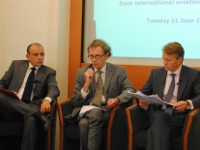{
"authors": [
"Antonio De Palmas",
"Alfons Guinier",
"Per Kågeson",
"Mark Major",
"Martin Porter"
],
"type": "event",
"centerAffiliationAll": "",
"centers": [
"Carnegie Endowment for International Peace",
"Carnegie Europe"
],
"collections": [],
"englishNewsletterAll": "",
"nonEnglishNewsletterAll": "",
"primaryCenter": "Carnegie Endowment for International Peace",
"programAffiliation": "",
"programs": [],
"projects": [],
"regions": [
"Europe"
],
"topics": [
"EU"
]
}
Avoiding Deadlock Over CO2 Emissions from International Aviation and Shipping
Tue, June 21st, 2011
Brussels
IMGXYZ3079IMGZYXCarbon dioxide emissions from international aviation and maritime transport account for 2 and 2.7 percent of all global emissions, respectively, and are rapidly increasing. But emissions resulting from international travel and shipping are not considered the responsibility of any particular country. Instead, the Kyoto Protocol calls on parties to work through the International Civil Aviation Organization and the International Maritime Organization (IMO) to regulate emissions. In the thirteen years since Kyoto passed, however, there is still no common agreement on market-based measures to curb emissions.
In the absence of progress, the European Union has decided to cap emissions from international aviation to and from Europe, and incorporate them into its Emission Trading Scheme starting in 2012. This act is being legally challenged by major U.S. airlines. The EU also declared that it intends to take unilateral action to reduce maritime emissions.
Carnegie Europe and Edelman |The Centre hosted Antonio De Palmas, President for EU & NATO Relations at Boeing International; Alfons Guinier, secretary general of the European Community Shipowners Association; Per Kågeson, professor at the Royal Institute of Technology Stockholm and director of Nature Associates; and Mark Major, policy officer at the Directorate-General for Climate Action, to discuss the EU’s efforts to cap maritime and aviation carbon dioxide emissions. Martin Porter, managing director of Edelman |The Centre, moderated.
The EU’s Role in Reducing Carbon Dioxide Emissions
Major noted that the European Parliament and Council are committed to tackling emissions, as well as taking the lead in creating new legislation to combat maritime emissions if the IMO does not reach an agreement by the end of this year. While the lack of any global agreement on measures to curb carbon dioxide emissions makes it difficult to implement a clear international strategy, the EU is currently seeking such an agreement while continuing to work on regional objectives, Major said. The EU is also acting in joint collaboration with non-EU states, including Norway and Iceland, Major added.
A Global or a Regional Policy?
- Regional to Global Scheme: If a global emissions reduction policy is not possible, then a regional scheme should be implemented, with the intention of eventually transforming it into a universal policy, Kågeson said.
- Problem with a Regional to Global Scheme: Guinier argued that a European emissions reduction regional measure is not practical, particularly in the shipping industry, as shipping covers a small part of global carbon dioxide emissions and the majority of shipping takes place outside Europe.
- Aviation: De Palmas said that a global approach to aviation emissions is needed and it can best be achieved under the framework of the International Civil Aviation Organization (ICAO).
Maritime/Shipping Industry
- International Shipping: IMO scenarios suggest that international maritime emissions will double or triple by 2050, said Major. Kågeson added that international shipping is not counted as part of the national emissions inventories reported annually to the UN Convention for Climate Change (UNFCCC).
- Technological Improvement: Kågeson highlighted the importance of advancing technology in the shipping sector. The purchase of newer, more energy-efficient vessels and the practice of “slow streaming,” or sailing at lower speeds, are two methods that have reduced oil consumption, he said.
- The Need for an IMO Agreement: Guinier emphasized the need for an IMO agreement, stressing that it would help reduce energy consumption.
- Lack of Clear Mechanisms: Major pointed out the lack of clear mechanisms in the shipping industry to reduce emissions, and an absence of the ability to monitor, report, and verify emission levels.
Aviation Industry
- Three Targets to the UNFCCC: De Palmas said that the aviation industry has presented a proactive strategy to cut carbon dioxide emissions to the UNFCC, highlighting three targets: carbon-neutral growth by 2020, sustaining a rate of 1.5 percent in improvements in efficiency through 2020, and a 50 percent reduction in emissions by 2015.
- Developing Fuel-Efficient Aircraft: De Palmas highlighted the importance of developing more fuel-efficient aircraft and delivering incremental gains in efficiency in aircraft that are already in service.
- Developing Sustainable Biofuel: The development of sustainable biofuel is necessary to avoid a deadlock over carbon dioxide emissions, De Palmas stressed. He added that Boeing, a U.S. company, is acting worldwide as an industry catalyst to accelerate the development and commercialization of aviation biofuels with high sustainability standards, working together with the Roundtable for Sustainable Biofuels.
These videos were generously contributed by the US-European Media Hub. Please find a more complete catalogue of their videos here.
Carnegie does not take institutional positions on public policy issues; the views represented herein are those of the author(s) and do not necessarily reflect the views of Carnegie, its staff, or its trustees.
Event Speakers
Antonio De Palmas
Alfons Guinier
Per Kågeson
Mark Major
Martin Porter